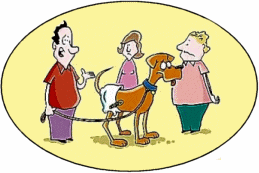|
The causes of urinary incontinence
In dogs, urine is retained or stored in the bladder. When the dog wants to urinate, the urine passes to the outside of the body through a small tube called the urethra. A normal dog can easily control this action. Urinary incontinence is involuntary or uncontrollable leaking of urine from the bladder. Small quantities of urine will leak from the urethra while an incontinent dog is resting or sleeping, and it will commonly be seen licking the vulva or penile opening.
Urine is prevented from leaking out of the bladder in normal dogs by a band of muscular tissue at the base of the bladder that acts as a valve that the dog consciously controls. We know today that certain hormones are important in this control. In the female, estrogen has a dramatic effect, giving strength to the muscular tissue of the bladder. In the male, testosterone has much the same effect. Anything that affects the levels of these hormones also affects the dog’s ability to retain his urine.
As a dog ages, the production of these hormones naturally decreases. Additionally, the main sites of their production, the ovaries in the female and the testicles in the male, are surgically removed when the dog is spayed or neutered.
Rarely, urinary incontinence can occur in younger animals due to congenital anatomic abnormalities. Infrequently, older dogs may have urinary incontinence due to
tumours or polyps in the bladder. Injury of nerves going to the bladder can also cause incontinence.
Prostate disease may also result in incontinence.
Who is at risk?
Hormone-responsive incontinence is more common in female dogs than it is in males, and more common in neutered and spayed dogs than in intact ones. Older dogs tend to be more prone to developing this condition. If the cause is old age, the problem is usually not seen until the dogs are eight to nine years of age. In spayed females, this problem usually does not occur until they are three or five years of age. Surprisingly, in males, whether they are neutered or not, this condition is rarely seen in dogs younger than ten years of age.
Problems resulting from urinary incontinence
Dogs suffering from urinary incontinence have some common secondary problems. They have a much higher incidence of bladder infections. It is believed that with the more lax opening to the bladder, it is easier for bacteria to migrate up the urethra and colonize the bladder. These dogs may need to be on antibiotics until the incontinence is dealt with.
Dogs with urinary incontinence frequently suffer from urine scalding. Urine is fairly caustic, and if it remains in contact with the skin for long periods of time, it can cause severe irritations. Scalded areas are usually treated topically with anti-inflammatory salves that also contain antibiotics.
Dogs who do not respond 100% to medication may still leak urine in small quantities. If this is the case, dog bloomers or panties with absorbent pads can be used to soak up the urine. Some people use human disposable diapers and cut out a hole for the tail.
Treatment
Treatment for incontinence is usually not difficult. Phenylpropanolamine (PPA) is a non-hormonal medication commonly used in male and female dogs to treat incontinence. (NOTE: In late fall, 1999, the federal Food and Drug Administration had banned PPA for human use. PPA is still available for dogs in a veterinary formulation.) Since the cause of urinary incontinence is generally a hormone deficiency, replacements with hormones or hormone substitutes may also be prescribed. Estrogen can be replaced by the compound diethylstilbestrol. After a brief period of daily doses, it is usually given once a week. At the minute levels used to treat incontinence in dogs, side effects are extremely rare. Dogs with hormone-responsive incontinence will need to remain on either PPA, diethylstilbestrol, or one of these other drugs for the rest of their lives.
Marty Smith, DVM
Drs. Foster & Smith, Inc.
Web Page

|